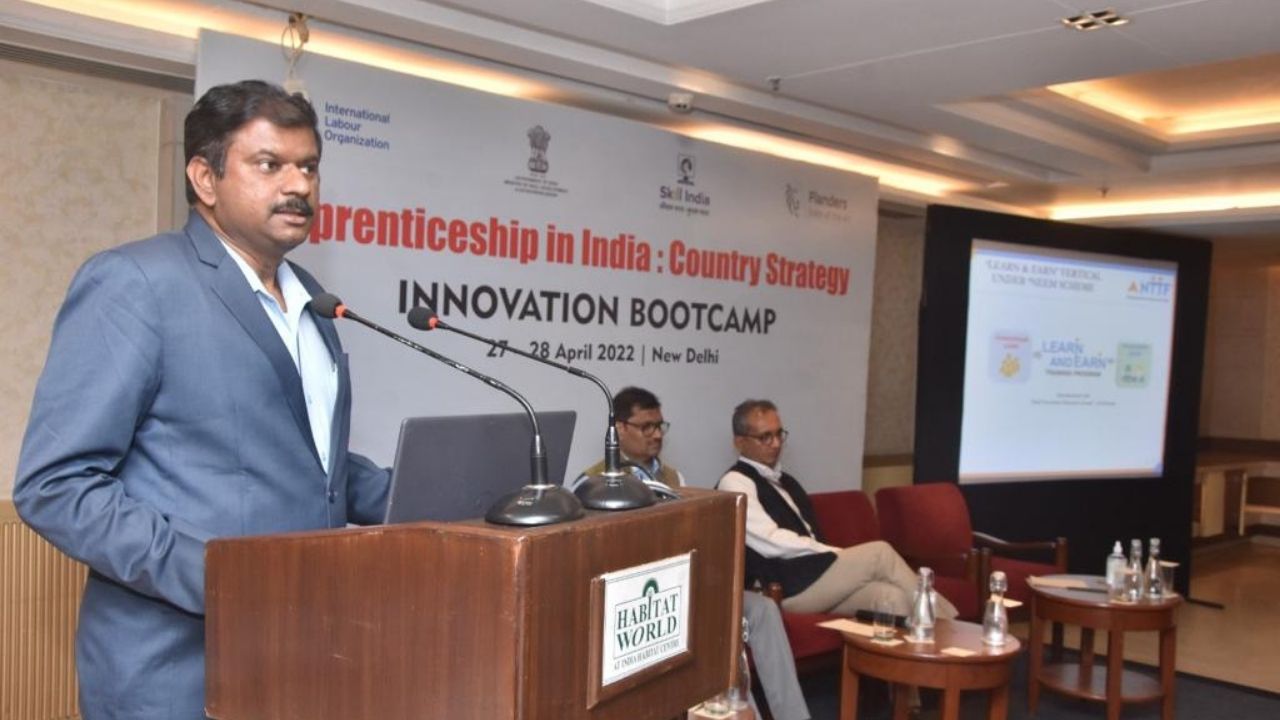This article is based on a presentation made by Mr. Anand. B, Vice President, NTTF at the recently held ILO event, “Apprenticeship in India: Country Strategy – Innovation Bootcamp”.
Let’s start by asking ourselves a few questions. What is the goal of technical education and training; is it empowering students with technical skills and placing them in jobs? Or, does the larger goal also include the holistic development of the individuals so that they are able to perform on the job and at the same time realize their own professional dreams.
If you agree that the second goal is more important than the first and it strives towards achieving tangible outcomes, then, the best practices followed by Nettur Technical Training Foundation (NTTF) are sure to interest you!
NTTF has been pioneering innovative models in skill development and vocational education over the past six decades. Their Diploma-holders are placed in the most lucrative jobs and those who turned entrepreneurs have created jobs for many. Most achievements of NTTF are attributed to the model and flawless execution in partnership with the industry. Here are few best practices that define their approach towards contributing the society, in particular the industry sector.
1. Outcome-based curriculum effectively delivered by the instructors and trainers inside the industry premises
Quite unlike a typical scenario where we expect the industry experts to guide the students during their exposure to the real world of work, NTTF deploys their faculty in the industry for three years. As per the design of the curriculum, the trainers at NTTF closely work with the students in the real industry environment to facilitate well-structured on-the-job training.
This is possible because of the strategic industry-academia partnerships NTTF has built over the years through a robust curricular framework that makes it mandatory for students to spend five days per week in the industry environment and one day in the classroom for the theoretical session.
2. Look beyond placements to support higher education qualifications
Even though the objective of most technical training is to make students employable and prepare them for the first job, we need to consider those students who would be interested in pursuing higher education like B.Tech and B.Voc degree programs. It’s always proven that students from NTTF get placed in suitable jobs after completing any program at NTTF. Those students need some hand-holding to make a lateral entry into the professional colleges.
 NTTF supports this aspiration of students by associating with some of the Universities and Engineering institutions encouraging students to pursue any work-integrated learning for academic accomplishment or upskilling as per industry requirements.
NTTF supports this aspiration of students by associating with some of the Universities and Engineering institutions encouraging students to pursue any work-integrated learning for academic accomplishment or upskilling as per industry requirements.
“For the industry, by the industry and with the industry – that’s how I would like to sum up our endeavors at NTTF in imparting skills that shape the nation. At NTTF, we have always strived towards making students responsible for their professional growth. We instill a sense of ownership at the place of work through student-projects that help us understand key aspects of productivity improvement, workplace safety and resource management.” Anand B, Vice-President, NTTF.
3. Convergence of education, industry exposure and employment
Work-integrated learning programmes from NTTF in the form of LEARN AND EARN scheme rolled out under the NEEM scheme, is a structured skill development programme delivered as Industry-Academia model. This programme has benefited thousands of students, especially those who come from socially disadvantaged sections of society. In fact, many students prefer to pursue a Diploma from NTTF rather than spending four years in an engineering college.
However, this is not limited to the quality and market value of the programmes and it goes beyond. It’s the emphasis on a comprehensive, well-rounded curriculum that differentiates technical training from conventional education, as it is highly practical oriented. NTTF values holistic development and ensures that the students acquire interpersonal competencies and other skills required to become good human beings and contribute to society.
To know more about NTTF’s best practices and their diploma courses, please visit NTTF dedicated page on our website.
Today, the narrative around skill development and vocational education is focused on ensuring demand-driven training and being industry-relevant. And, it’s a proven fact that without industry participation and ownership, technical education and training will not yield the desired results. In such a scenario, the best practices from NTTF provide compressed wisdom that can be applied to solve many issues in successful implementation of vocational programmes.
Subscribe to our YouTube channel for more updates:
Subscribe on YouTube




Life long learning is a key for happy and dignified living.